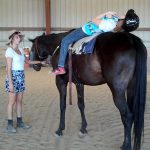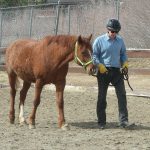 Come on! We all worry at times. Am I going to be late? Did I remember to lock the back door? Am I going to run out of gas? Are the kids ok? How did I do on the test? All of these can be valid and ‘normal’ concerns. However, there is a point when ‘worrying’ can become a mental health issue.
Come on! We all worry at times. Am I going to be late? Did I remember to lock the back door? Am I going to run out of gas? Are the kids ok? How did I do on the test? All of these can be valid and ‘normal’ concerns. However, there is a point when ‘worrying’ can become a mental health issue.
In this HealthEssentials article by Cleveland Clinic, Clinical psychologist Joseph Rock, PsyD, defines the difference between ‘worry’ and ‘anxiety,’ provides some information about a variety of ‘anxiety disorders’ and provides 5  signs that may indicate that it is time to seek help.
signs that may indicate that it is time to seek help.
Work with horses can be a powerful and effective intervention for those dealing with anxiety disorders.  Horses offer an opportunity to interact on a non-demanding, but connected level. There are no expectations and no judgements. There is no rush and no timeline for what you do. Clients practice being present and in the moment – no worrying about that past or what is to come – just right here, right now. They allow us build/rebuild
Horses offer an opportunity to interact on a non-demanding, but connected level. There are no expectations and no judgements. There is no rush and no timeline for what you do. Clients practice being present and in the moment – no worrying about that past or what is to come – just right here, right now. They allow us build/rebuild  confidence and self-esteem. They help us realize that, even when we think we can’t do something, we probably can. We are capable of so much more than we give ourselves credit for. Through work with horses we learn and practice self-soothing/calming skills such as deep breathing and visualizations. It is impressive when a client finally relaxes and
confidence and self-esteem. They help us realize that, even when we think we can’t do something, we probably can. We are capable of so much more than we give ourselves credit for. Through work with horses we learn and practice self-soothing/calming skills such as deep breathing and visualizations. It is impressive when a client finally relaxes and then feels their horse give a great big sigh, indicating that they too are finally feeling more relaxed.
then feels their horse give a great big sigh, indicating that they too are finally feeling more relaxed.
If the symptoms listed in the referenced article feel all to familiar, consider seeking help. We are here to be part of a comprehensive treatment program. We would be happy to schedule a visit for  you. We will show you around the ranch, introduce our incredible herd, learn more about what you are dealing with and share how we may be able to help. Call or email us today.
you. We will show you around the ranch, introduce our incredible herd, learn more about what you are dealing with and share how we may be able to help. Call or email us today.
